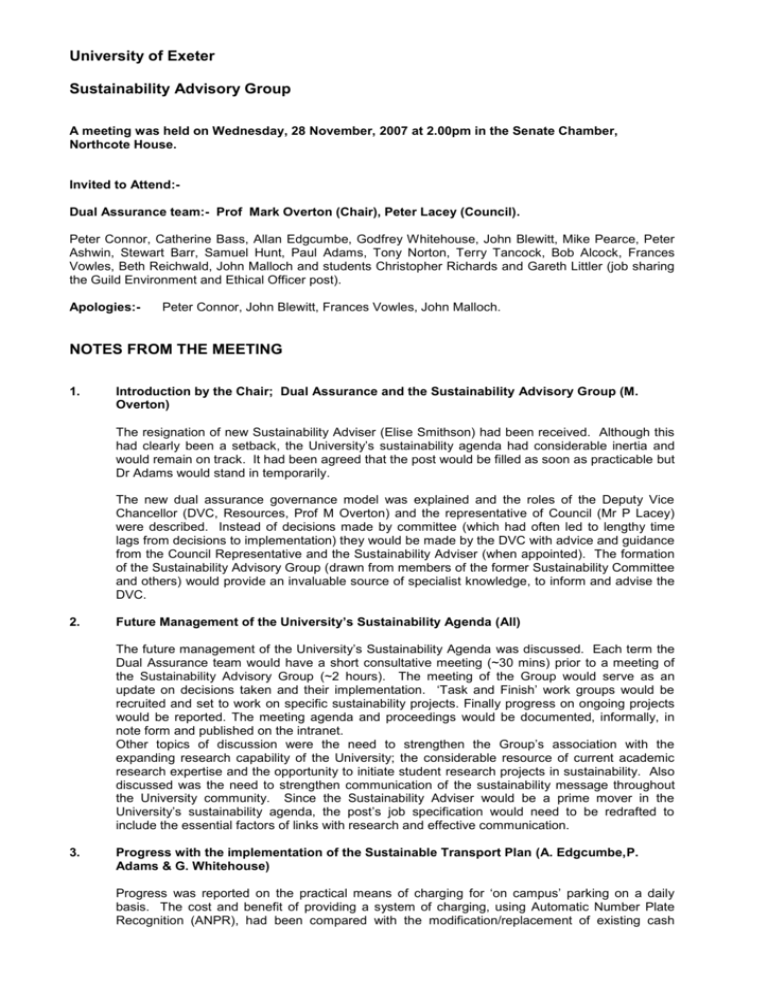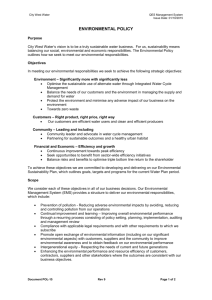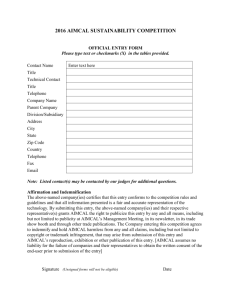28 November 2007
advertisement

University of Exeter Sustainability Advisory Group A meeting was held on Wednesday, 28 November, 2007 at 2.00pm in the Senate Chamber, Northcote House. Invited to Attend:Dual Assurance team:- Prof Mark Overton (Chair), Peter Lacey (Council). Peter Connor, Catherine Bass, Allan Edgcumbe, Godfrey Whitehouse, John Blewitt, Mike Pearce, Peter Ashwin, Stewart Barr, Samuel Hunt, Paul Adams, Tony Norton, Terry Tancock, Bob Alcock, Frances Vowles, Beth Reichwald, John Malloch and students Christopher Richards and Gareth Littler (job sharing the Guild Environment and Ethical Officer post). Apologies:- Peter Connor, John Blewitt, Frances Vowles, John Malloch. NOTES FROM THE MEETING 1. Introduction by the Chair; Dual Assurance and the Sustainability Advisory Group (M. Overton) The resignation of new Sustainability Adviser (Elise Smithson) had been received. Although this had clearly been a setback, the University’s sustainability agenda had considerable inertia and would remain on track. It had been agreed that the post would be filled as soon as practicable but Dr Adams would stand in temporarily. The new dual assurance governance model was explained and the roles of the Deputy Vice Chancellor (DVC, Resources, Prof M Overton) and the representative of Council (Mr P Lacey) were described. Instead of decisions made by committee (which had often led to lengthy time lags from decisions to implementation) they would be made by the DVC with advice and guidance from the Council Representative and the Sustainability Adviser (when appointed). The formation of the Sustainability Advisory Group (drawn from members of the former Sustainability Committee and others) would provide an invaluable source of specialist knowledge, to inform and advise the DVC. 2. Future Management of the University’s Sustainability Agenda (All) The future management of the University’s Sustainability Agenda was discussed. Each term the Dual Assurance team would have a short consultative meeting (~30 mins) prior to a meeting of the Sustainability Advisory Group (~2 hours). The meeting of the Group would serve as an update on decisions taken and their implementation. ‘Task and Finish’ work groups would be recruited and set to work on specific sustainability projects. Finally progress on ongoing projects would be reported. The meeting agenda and proceedings would be documented, informally, in note form and published on the intranet. Other topics of discussion were the need to strengthen the Group’s association with the expanding research capability of the University; the considerable resource of current academic research expertise and the opportunity to initiate student research projects in sustainability. Also discussed was the need to strengthen communication of the sustainability message throughout the University community. Since the Sustainability Adviser would be a prime mover in the University’s sustainability agenda, the post’s job specification would need to be redrafted to include the essential factors of links with research and effective communication. 3. Progress with the implementation of the Sustainable Transport Plan (A. Edgcumbe, P. Adams & G. Whitehouse) Progress was reported on the practical means of charging for ‘on campus’ parking on a daily basis. The cost and benefit of providing a system of charging, using Automatic Number Plate Recognition (ANPR), had been compared with the modification/replacement of existing cash ticket machines. The new machines could accept either cash or a swipe card (which could be topped up with credit). A comparative business plan would be presented before the end of the year. A decision was awaited from Devon County Council (Heather Baker) regarding 50% matched funding for an addition shelter at the secure cycle store at St Luke’s campus. Other sites for improved cycle store facilities on the St Luke’s Campus had also been identified. Future decisions on cycle provision would be made by ‘Unicycle’ (a former subgroup of the Sustainability Committee). This would become the cycling ‘Task and Finish’ Group. ‘Unicycle’ had recently been determining optimum (minimum gradient) cycle routes for the Streatham Campus. 4. Progress with implementation of the Energy and Carbon Management Plan (G. Whitehouse) In the two year period (Aug) 05 to (Jul) 07, energy consumption for the Exeter sites was down by between 15 and 22%. The carbon dioxide emissions were down 17% or 10% when weather corrected. This far exceeded the target of 2% reduction p.a. The reductions were thought to be mainly due to improved efficiency of the electronic building management system (BMS), the mild 06/07 winter and the closure of Duryard (with its inefficient electrical heating). There had been a further reduction in water consumption of 9%, bringing the total reduction to 42% since 2003/4. In spite of unit cost increases for electricity (67%), gas (31%) and water (10%), the overall increase had been held at 17% by reduced consumption. The total utilities bill for 06/07 was £3.84 million, which represented a budget saving of £1 million. The University’s carbon management plan was approved by Council in July 2007. A schedule of works is either underway or planned. GW had received, on behalf of the University, a Certificate of Achievement form the Carbon Trust, for (his &) its success in devising and implementing the plan. 5. Progress with the ‘Total Waste Solution’ Contract with Biffa Ltd (M. Pearce) There had been significant ‘teething’ troubles with the new waste contractors, Biffa. Many problems remained to be overcome and regular monthly liaison meetings were being held. Since commencement of the contract, the quantity of recycled waste collected had increased but the quantity of landfill waste had remained static and had not decreased as desired. This was disappointing. An important factor in this was considered to be the lack of suitable and sufficient recycling receptacles available to people both within buildings and on the campuses. 6. The University’s Sustainable Procurement Policy (M Pearce for J. Malloch) The new draft (issue 2) Sustainable Procurement Policy was welcomed by the Group, as was the appointment of a new Head of Procurement (Mr John Malloch, who was unable to attend the meeting). The Policy had many strong aspirations which, when implemented would significantly contribute to the University’s sustainability agenda. One aspiration discussed was the desire for the University to purchased only 100% recycled paper for all of its printing paper needs. 7. Management of the Sustainability Agenda in Australian Universities (B. Reichwald) Beth Reichwald, a member of administrative staff with a strong interest in sustainability, was awarded an AUA (Association of University Administrators) bursary to undertake a study tour of the management of sustainability in a number of universities in Eastern Australia (including Melbourne and Sydney). In her ‘PowerPoint’ presentation she described their energy conserving and recycling initiatives. In a country with scarce water resources, the conservation of water was of considerable importance and necessity. As a result, their water conservation projects had been particularly imaginative and successful. Ms Reichwald presentation of extremely informative and well received. She was enthusiastically invited to join the Group. Notes prepared by P. Adams, 06 March 2016








